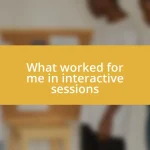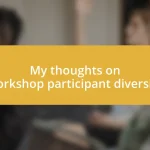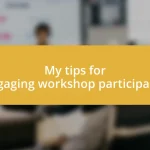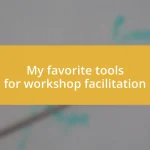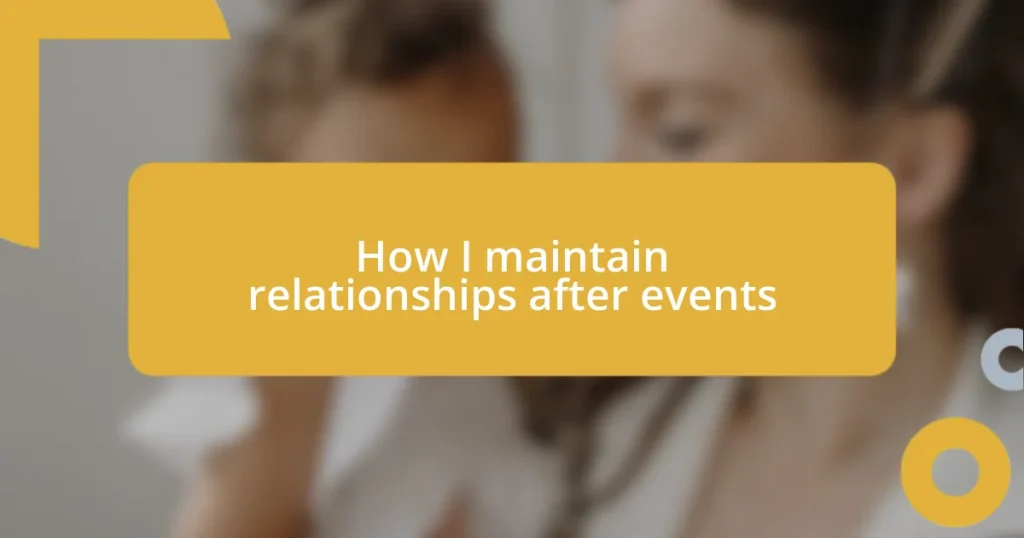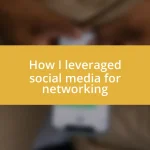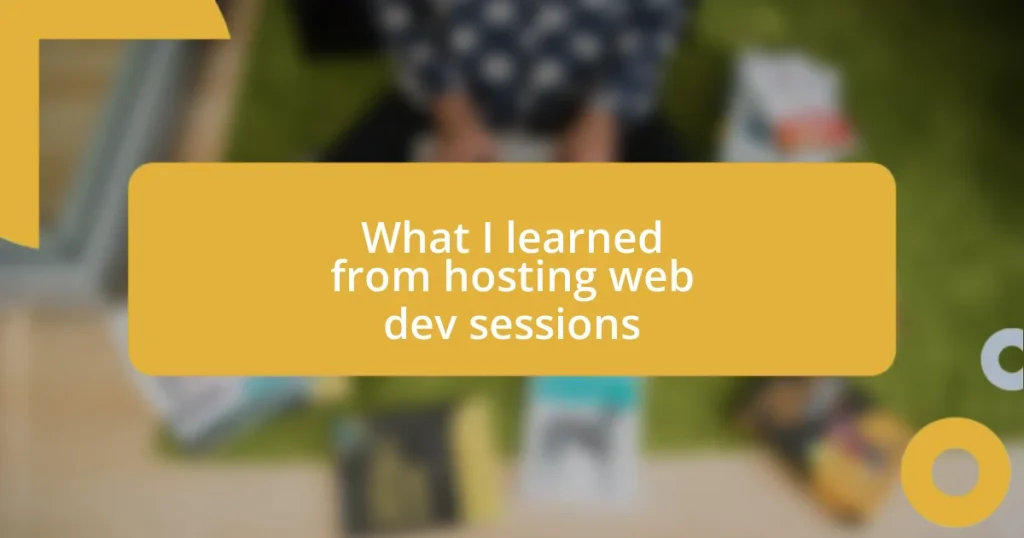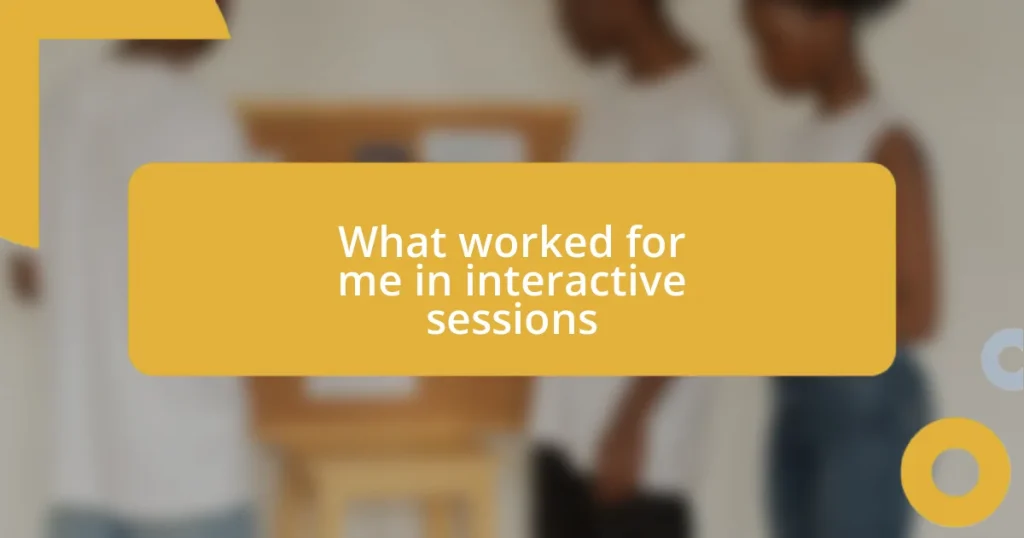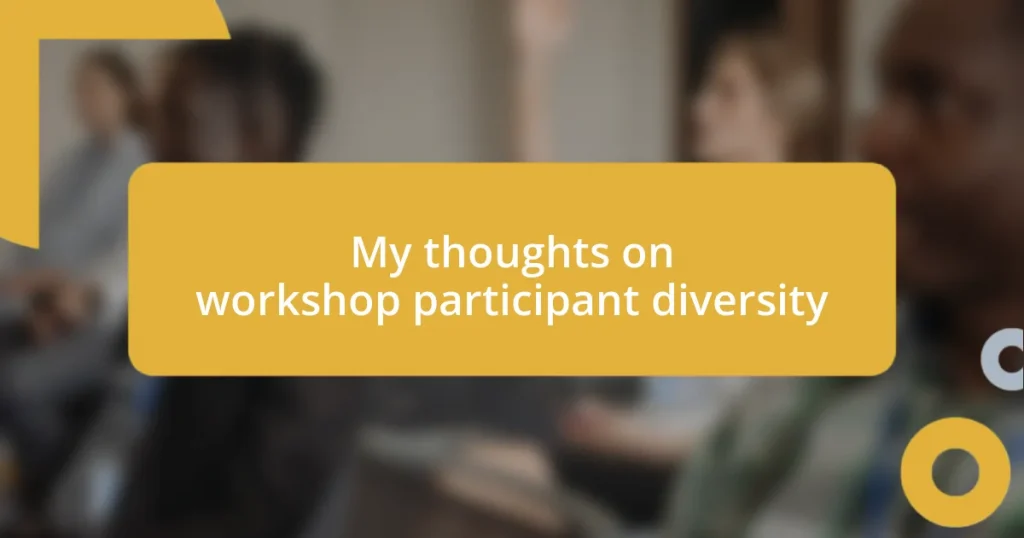Key takeaways:
- Significant events can reshape relationships, highlighting the importance of understanding emotional dynamics and communication styles post-event.
- Follow-up strategies, such as personalized messages and regular check-ins, are vital for nurturing connections and fostering ongoing dialogue.
- Addressing conflicts and misunderstandings promptly and transparently strengthens relationships by transforming difficult conversations into opportunities for growth and deeper connections.

Understanding relationship dynamics after events
When a significant event occurs—be it joyful or challenging—relationships often undergo a shift because we start to see each other in new lights. I recall a family reunion where old rivalries resurfaced, revealing dynamics I thought were long buried. How do we navigate these changes? It can feel overwhelming to reconcile past grievances with the present.
These dynamics are not static; they evolve as we redefine our connections. For instance, after a close friend experienced a major life change, our conversations deepened, allowing for vulnerability that wasn’t there before. Have you ever noticed how some relationships strengthen in the aftermath of events, while others may fade? It’s fascinating how shared experiences can either forge bonds or create distance.
Understanding the emotional currents running through our relationships is essential. I remember feeling both excitement and anxiety during a friend’s wedding. The joy of celebrating the moment was met with the realization of how many different paths we had all taken. Are we truly listening to each other, or merely going through the motions? These reflections can illuminate the nuances of what we desire in our connections moving forward.

Establishing communication methods post-event
Establishing clear communication methods after an event can significantly enhance how we maintain relationships. I’ve found that using a mix of follow-up texts and phone calls can make a real difference. For example, after attending a friend’s engagement party, I sent a heartfelt message the next day, expressing my excitement and asking how they felt about the celebration. This simple gesture opened up a deeper conversation, which strengthened our bond.
In my experience, the choice of medium can also affect the depth of our communications. While texting is quick and convenient, I’ve learned that a voice call can convey emotions more effectively. After a family gathering, I decided to make calls to key relatives to discuss how everyone was feeling about the changes that had occurred since our last meeting. This not only allowed me to connect on a more personal level but also helped everyone feel heard.
Moreover, it’s essential to establish a regular communication rhythm, especially if the event has sparked turbulence in relationships. I typically suggest a monthly check-in with friends or family following impactful events. This practice creates a foundation for ongoing dialogue. It reminds me of a time when I initiated a group video call with friends after a tough event; the laughter we shared helped us all to heal, illustrating how crucial it is to keep the conversation going.
| Communication Method | Pros |
|---|---|
| Text Messaging | Quick, convenient, allows for sharing links or images. |
| Phone Calls | More personal, captures tone and emotion better. |
| Video Calls | Engaging and allows for non-verbal communication; excellent for group interactions. |
| In-Person Meetings | Deepest connection, encourages heartfelt conversations but requires more time and planning. |

Nurturing connections through follow-up
Nurturing connections through follow-up is something I find crucial after any event. After attending a friend’s milestone birthday, I felt compelled to reach out afterward. I took the time to craft a handwritten note, expressing my gratitude for being included in the celebration and sharing a favorite memory from the night. It was a small gesture but one that reignited our friendship and led to a deeper conversation about our lives since we last connected.
I’ve learned that consistent follow-up can create a safety net for relationships, especially after emotionally charged events. Here are some strategies that have proven effective in my experience:
- Personalized Messages: Tailor your follow-up by referencing a specific moment from the event, solidifying the connection.
- Schedule a Catch-Up: Propose a coffee or a walk, transforming a casual greeting into quality time together.
- Share Relevant Content: Send articles or videos that relate to conversations you had, showing you’re thinking about them even after the event.
- Check-In on Emotions: Ask how they felt about the event; it opens the door for deeper conversations and fosters trust.
- Express Gratitude: A simple thank you for their presence can go a long way in making someone feel valued post-event.
These approaches not only strengthen the bond but also show that you genuinely care about maintaining the relationship.
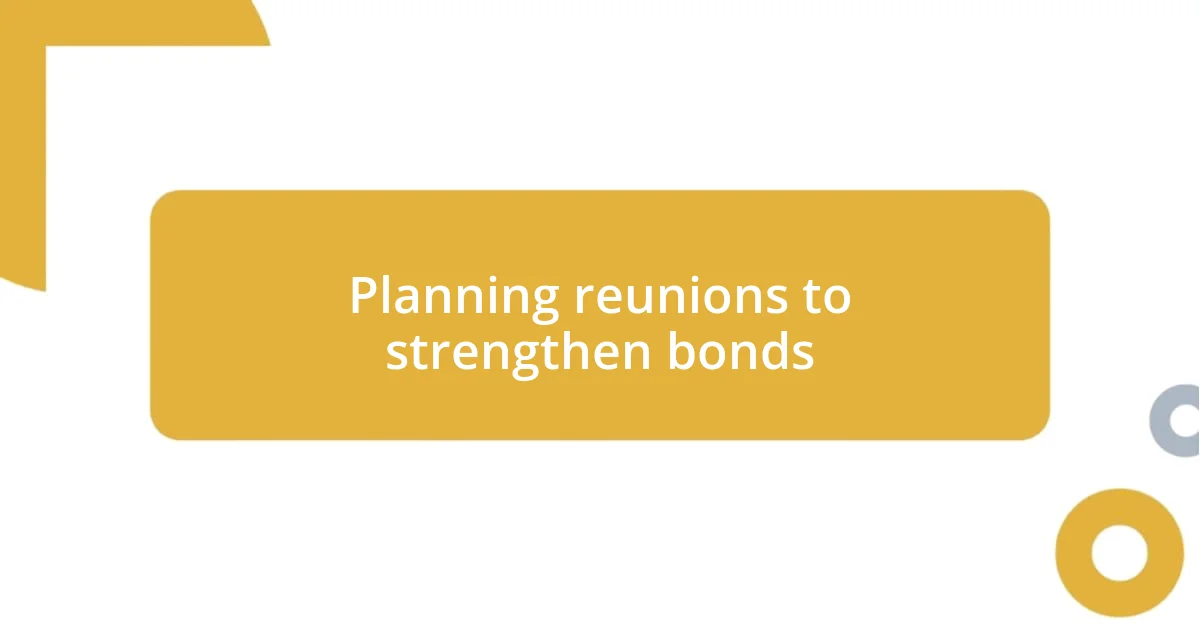
Planning reunions to strengthen bonds
Planning reunions is a fantastic way to reinforce the connections we’ve built over time. I remember organizing a small reunion with my college friends a few months after our last gathering. We hadn’t seen each other in ages, and I couldn’t help but wonder: how do we ensure that those bonds we formed don’t fade away? By simply scheduling a get-together at a cozy café, I realized we could reconnect over coffee, share stories, and laugh as if no time had passed at all.
I find that setting a specific theme or activity for these reunions can really enhance the experience. For instance, one time, I hosted a game night, and the excitement in the room was palpable. The friendly competition sparked spontaneous conversations and reminiscences. Isn’t it amazing how shared experiences can instantly revive a sense of closeness? I loved hearing everyone’s playful banter and seeing those genuine smiles, reminding us of the joy in our friendships.
Another effective strategy is to create a routine for these reunions. It doesn’t have to be monthly; even quarterly gatherings can make a world of difference. Personally, I’ve started a tradition with a few close friends where we meet every three months. We alternate between hosting duties, and it’s enthralling how these scheduled moments have become something we all look forward to. Looking back, I’ve realized that planning these reunions not only strengthens our bonds but also lays the groundwork for deeper connections that withstand the test of time.

Utilizing social media for engagement
Utilizing social media can be a game-changer for engagement after events. I vividly recall scrolling through my Instagram feed after a friend’s wedding and feeling a rush of nostalgia when I saw the pictures I had shared. It was my way of reliving that beautiful day and connecting with others who were also there. I decided to tag my friend in a post, which sparked instant conversations in the comments. It felt as if we were right back there on the dance floor, sharing laughter and memories.
I also find that private groups on platforms like Facebook can create a space for ongoing dialogue. After an industry conference, I joined a group meant for attendees, where we could post thoughts, share resources, and even plan future meetups. I remember posting a summary of my favorite sessions, which led to a vibrant discussion that included insights from others. It was incredible to see how this virtual space enriched our connections and deepened our professional relationships.
Another effective tactic I use is posting stories or updates that relate to shared experiences. Recently, I uploaded a fun video montage from a recent gathering and tagged everyone involved. The joy I felt watching my friends respond with their own memories and reactions was unforgettable. Isn’t it amazing how a mere post can revive laughter and anecdotes, paving the way for further conversations? I’ve realized that social media, when used thoughtfully, is a powerful tool for keeping relationships alive and thriving long after the initial event.

Sharing memories to reinforce ties
Sharing memories can truly deepen the bonds we have with others. I remember sitting with my family at a dinner table a few weeks after the holiday season. As we flipped through photos from our family gathering, the laughter and playful teasing of old stories filled the room. It was such a delightful reminder of the moments we cherished. Isn’t it incredible how a simple photo can evoke such vivid memories and emotions?
I also find that crafting scrapbook-style keepsakes can be an emotional touchpoint. After a recent trip with friends, I took the time to compile all the photos and little mementos into a shared album, complete with funny captions. When we all met up again, we spent hours flipping through it, reliving our adventures and adding new memories to the mix. It amazed me how this activity prompted everyone to share their own insights and feelings about our experiences, reinforcing our connections even further.
Engaging in storytelling around shared experiences can spark something magical too. I once participated in a storytelling night where everyone was encouraged to share their favorite memory from our last event together. The room was filled with laughter and heartfelt emotions as we recounted those moments. I couldn’t help but think: how does sharing these stories transform our relationships? For me, it illuminated the bond we share and showcased the unique perspectives each person brings. It’s a beautiful reminder that our memories are intertwined, making them feel even more special.
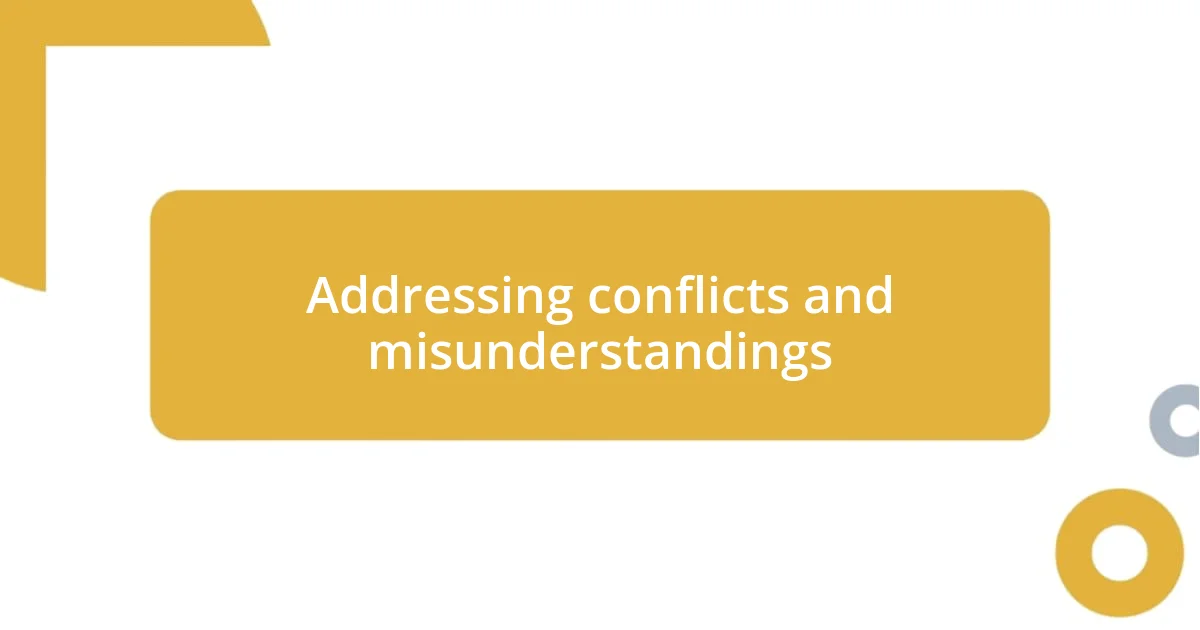
Addressing conflicts and misunderstandings
Addressing conflicts and misunderstandings is a delicate yet essential part of maintaining relationships after events. I vividly remember a misunderstanding I had with a close friend over a group project, where assumptions led to hurt feelings. Instead of letting it brew, I reached out to her over coffee. The atmosphere shifted from tension to openness as we each shared our perspectives, and it was a relief to finally clear the air.
I believe that addressing conflicts promptly is crucial and requires a genuine willingness to listen. I’ve experienced situations where bringing up discomfort immediately transformed a potentially volatile conversation into a constructive one. Once, I had to address criticism I overheard about my presentation skills after a seminar. By approaching my colleague with curiosity, rather than defensiveness, I learned she had well-intentioned advice that ultimately made me a better speaker. Have you ever been surprised by the outcomes of uncomfortable conversations? For me, they often lead to unexpected growth.
Being transparent in communication also takes the relationship to another level. After a tense family gathering where disagreements were left hanging, I initiated a group video call to express my feelings and encourage everyone to do the same. What began as an awkward chat evolved into an insightful conversation, where we not only cleared misunderstandings but also recognized how our differing perspectives enriched our family dynamic. It’s amazing how vulnerability can bridge gaps, isn’t it? Reaching out to resolve conflicts isn’t just about mending fences; it fosters a deeper connection that can last well beyond the event that triggered the discord.

